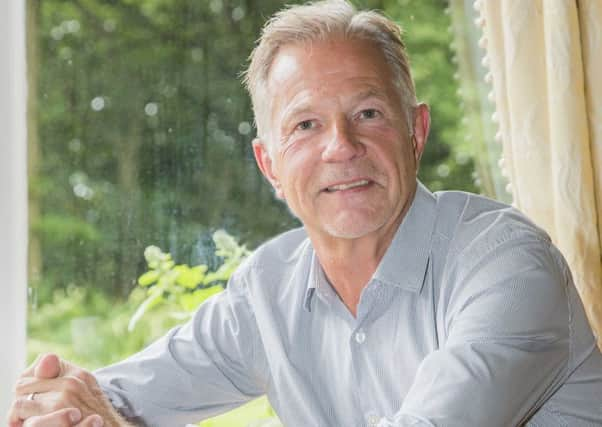Knee pain was silent killer


When Jeremy Carter started suffering pains in his knee three years ago the last thing he thought was cancer.
The 58-year-old from Rawden thought it might have been to do with his cartilage caused by an old football injury or from running which he does twice a week.
Advertisement
Hide AdAdvertisement
Hide AdBut then last year the intermittent pain worsened and became more frequent. One morning he woke up in pain and decided to make an appointment with his GP.
He had a lump the size of a marble removed and a biopsy revealed it was Grade 2 sarcoma.
Sarcoma is a rare type of cancer that can affect almost any part of the body, on the inside or the outside.
Sometimes called a ‘silent killer’, because symptoms of sarcoma are not well known, it is often not discovered until the late stages when successful treatment is much more difficult.
Advertisement
Hide AdAdvertisement
Hide AdJeremy had not been aware of a lump, only symptom was dull ache which worsened to pain.
“It came as a massive shock to me,” says Jeremy. “Especially as my GP initially thought it was a damaged cartilage or a problem with my knee joint.”
He was referred to a sarcoma specialist, Ian Smith, consultant plastic surgeon at Spire Leeds Hospital.
Two weeks later Mr Smith performed surgery to remove the margin to ensure it had all been removed.
Advertisement
Hide AdAdvertisement
Hide AdHe had an overnight stay in hospital. The surgery left Jeremy ain free and he was back to work as a compnay director three weeks later.
Now he is joining a campaign to highlight the symptoms of sarcoma.
“My experience shows how difficult the condition is to detect. I failed to spot a lump the size of a marble in my knee joint,” says the father of two. “It had got underneath the tissue so it was undetectable to me.
Now during Sarcoma Awareness Week Jeremy and Mr Smith want to raise awarenesss of the disease.
“I believe awareness could save lives,” says Mr Smith.
Advertisement
Hide AdAdvertisement
Hide Ad“The earlier it’s diagnosed, the better chance we have of survival. Unfortunately delays in diagnosis for sarcomas are common. It can be in an advanced stage before it’s discovered because sarcomas often present as slow growing painless lumps which might not prompt people to get it checked by their GP straignt away.”
According to a public poll run by the Sarcoma UK in 2015, 53 per cent of people have not heard of sarcoma and only 26 per cent knew it was a cancer.
Sarcomas are rare cancers that can develop in the muscle, bone, nerves, cartilage, tendons, blood vessels and tissues.
They can occur at any age and affect children as well as adults. Around 3,800 new cases of sarcoma are diagnosed each year in the UK.
Advertisement
Hide AdAdvertisement
Hide AdThere are two main types; soft tissue sarcomas and bone sarcomas. As with most types of cancer, the outlook depends largely on how far the cancer has advanced when it is diagnosed.
“If the cancer is detected at an early stage and can be removed by surgery, then there is a possibility that it can be cured. A cure is not usually possible if a soft tissue sarcoma is only detected at a late stage when it has already spread to other parts of the body, although treatment can help slow the spread of cancer and control the symptoms.”
Survival rate varies according to the type of sarcoma and size of the tumour.
“Figures of 50-60- per cent five year survival are often quoted for soft tissue sarcomas, however it is very variable,” he added.
Advertisement
Hide AdAdvertisement
Hide AdMr Smith added, “Most lumps are not sarcoma. However, it’s important to have any lump greater than 5cm that’s painful or increasing in size seen by ayour doctor and, if necessary, referred to a specialist sarcoma centre such as Spire Leeds Hospital which has a number of Sarcoma Multi Disciplinary Team members specialising in this type of cancer.”
Sarcoma is also in the national spotlight this year, being chosen by 10 Downing Street as it’s Charity of the Year for 2016 in memory of Chris Martin, principal private secretary to the Prime Minister, who died of sarcoma in November 2015.
As for Jeremy he has been given the all clear following his surgery, but has to go for three monthly check ups to ensure the cancer hasn’t returned.
“The hope is that these check ups will become less frequant as as time goes on,” he adds.